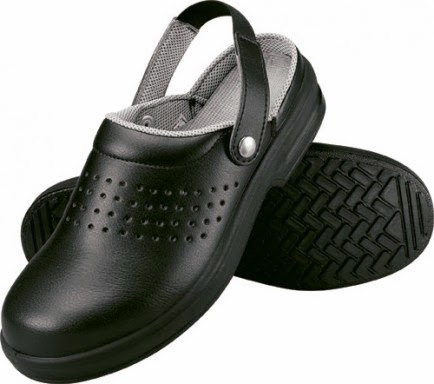Before buying safety footwear (or any PPE) it is a good idea to refer to a recent risk assessment, or if one doesn't already exist this is the ideal opportunity to assess your workplace and/ or working practices. This will give you a solid idea of the existing and potential hazards you need to guard against.
Some points to consider in your risk assessment are:
• Are there slippy surfaces in the workplace?
If yes, non slip soles will be essential.
 |
| Click Safety Boots - a great all rounder |
Metatarsal protectors safeguard the bridge of the foot.
• Is there a risk of objects penetrating the sole?
Mid-sole protection is required. Composite midsoles provide
greater coverage.
• Are acids/ alkalis/ chemicals present in the workplace?
Choose shoes/ boots with acid/ alkali resistant soles. It will help to know the type of chemicals present
-seek specialist advice.
• Is there a need for cut protection?
Chainsaw boots will protect from the cutting power of an active chainsaw.
• Is heel or ankle support required, are staff working on uneven ground?
Choose a good secure fit, offering plenty of support. Lace up styles will allow workers to customise
the fit.
• Is there risk of contact with molten metal?
Foundry boots are specially designed for this hazard. Heat resistance and quick release fastenings are
important features for this use.
 |
| Cofra Bering BIS Cold Store Boot. |
For cold store use you will need to select boots with thermal
insulation that have been tested to the appropriate temperature.
For high temperatures look for heat resistant soles tested to the
appropriate temperature, with a breathable fabric.
• Are there biohazard or hygiene risks?
Easy clean/ machine washable safety shoes with breathable
fabric.
• Are employees working in wet conditions?
Safety wellies offer toe cap and midsole protection with water resistance. Some styles are resistant to
chemicals.
 |
| Washable Safety Clog.Comfort for long hours of work. |
It is important to regularly check PPE for faults or weaknesses which may prevent it working properly. It is also a good idea to periodically review your safety equipment as new developments and products may have become available.
For further advice on selecting and buying footwear you can view the Safety Footwear Buyer's Guide on our website.

No comments:
Post a Comment